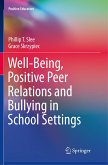The current book describe and test a model which considers Self-efficacy as antecedent of performance among students by the way of well-being (i.e. burnout & engagement). Accordingly, this book shows how Efficacy beliefs influence students' well-being and their performance. Different samples of students from diverse countries were used in order to conduct cross-sectional, longitudinal, and experimental analyses. Preliminary studies carried out supported the hypothesis that, in case of students, Efficacy beliefs play a predicting role of well-being which in turn, leads to higher performance in their studies. The most relevant conclusions of this book are: - Past performance is a very good predictor of future performance among university students but only by the way of self-efficacy beliefs. That is, self-efficacy beliefs of students play a key role in order to become students more effective in their studies. - This key role of efficacy beliefs has been tested in students from different countries. - Increases of self-efficacy beliefs have shown empirically a positive effect on performance.
Bitte wählen Sie Ihr Anliegen aus.
Rechnungen
Retourenschein anfordern
Bestellstatus
Storno








